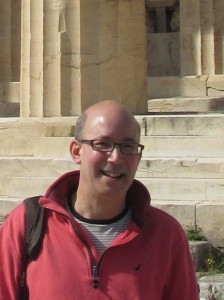David Rosenbloom is Professor of Ancient Studies. He earned an A.B. Honors from Cornell University in 1984, and an M.A. and Ph.D. from Princeton University in 1986 and 1992 respectively. He taught at Victoria University in Wellington, New Zealand from 1994 until 2012 and was awarded the Vice-Chancellor’s Award for Excellence in Teaching in 2001. David was a Junior Fellow at the Center for Hellenic Studies in Washington, D.C. in 1998-1999, and has held visiting appointments at Princeton University (Fall 2003) and Johns Hopkins University (2008-2009). He joined the Ancient Studies Department at UMBC in 2012 and has served as Chair of the department since 2014.
A Hellenist, David has published widely on Athenian tragedy and comedy, history, and oratory. In addition to a book on Aeschylus’ Persians (London: Duckworth, 2006), which Kardamitsa published in Antonis Petrides’ Greek translation in 2023, he has co-edited (with John Davidson) a volume of essays on Greek Tragedy and Comedy, Greek Drama IV: Texts, Contexts, Performance (Oxford: Aris & Philips, 2012) and a volume of essays (with Jeremy Armstrong and Arthur Pomeroy), Money, Warfare and Power in the Ancient World: Studies in Honour of Matthew Freeman Trundle (London: Bloomsbury, 2024). His most recent publications include, “The Rhetoric and Theatrics of the Unspeakable in Greek Tragedy,” in E. Papadodima ed., Faces of Silence in Ancient Greek Literature (Berlin: De Gruyter, 2020) 113-156; “Aeschylus’s Athens between Hegemony and Empire,” in J. Bromberg and P. Burian, eds., Companion to Aeschylus (London: Wiley-Blackwell, 2023) 373-388. Two publications, “Naval Service and Political Power in Classical Athens: an Inverse Relation,” in J. Armstrong, A. Pomeroy and D. Rosenbloom eds., Money, Warfare and Power in the Ancient World: Studies in Honour of Matthew Freeman Trundle (London: Bloomsbury, 45-71), and “No Way In and No Way Out: the Seven against Thebes,” in A. Sommerstein and A. Markantonatos eds., Brill’s Companion to Aeschylus (Leiden and Boston: E.J. Brill), will be published in 2024.
David is currently working on separate studies of Aristophanes’ Ploutos and Euripides’ Hecuba. Many of his publications are available on his Academia.edu site. You can download his most recent CV here.
